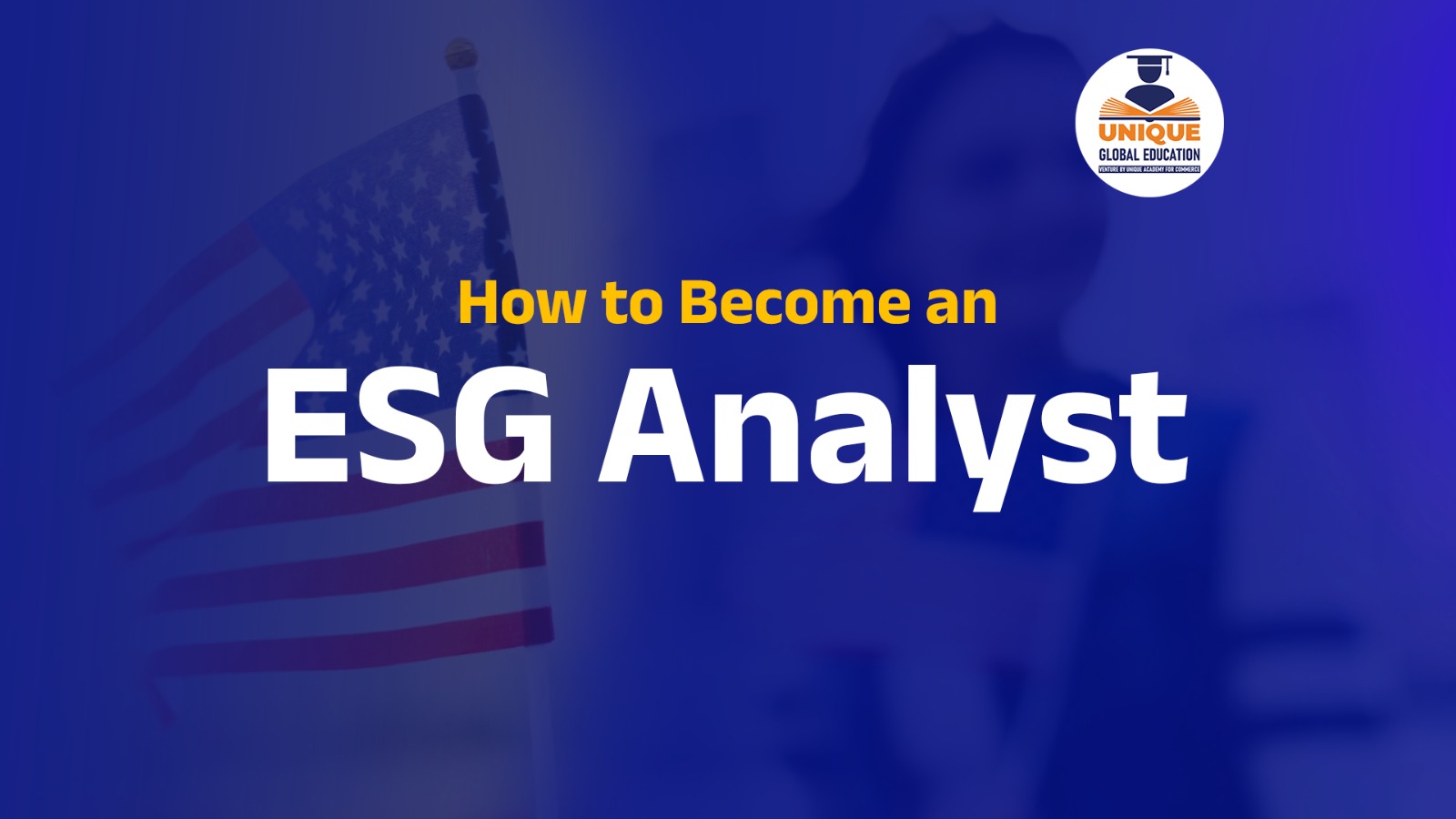In recent years, ESG investing has gone from a niche consideration to a mainstream imperative for ALL businesses and investors. It’s no wonder that ESG Analyst roles – positions that assess a company’s performance on environmental, social, and governance issues – are now a must-have for professionals in finance, consulting, sustainability, and corporate strategy. If you’re attracted to a career that brings together finance, ethics and global responsibility, work as an ESG analyst might be the role for you.
In this article, we’ll take you through all you need to know about becoming an ESG Analyst: the job, skills, qualifications, and career path.
Table of Contents
Who is an ESG Analyst?
ESG Analyst An ESG Analyst conducts analysis of and researches on companies that are considered to be from the viewpoint of development, on the basis of these criteria’s fields. These include:
- Environmental: The impact of climate change, carbon footprint, waste management, energy efficiency etc.
- Social: Labor practices, diversity, employee relations, community engagement.
- Governance: Board composition, executive pay, shareholder rights, business ethics.
They give out ESG scores or insights and contribute to informing investors or stakeholders into making decisions on a company’s long-term sustainability and ethical soundness.

Roles and Responsibilities of an ESG Analyst
Specific details of a role will depend on the industry, the type and size of the organization, and its career ladder, but you are likely to:
- Data Mining: Collecting ESG-related information from corporate reports, government records and third-party sources.
- Risk assessment: Identification and analysis of ESG risks and opportunities.
- Scoring and Rating: allocation of ESG scores according to internal or external methodologies (e.g., MSCI, Sustainalytics, GRI).
- Reporting: Creating in-depth ESG reports and Investment Cases.
- Stakeholder Engagement: Work closely with portfolio managers, sustainability teams, compliance officers.
- Trend Watching: Keeping up with changes in legislation and industry practice such as ESG disclosure regulations, EU taxonomy, SEC guidance.
Why ESG Careers Are Growing
Here’s why ESG is 1 of the fastest growing job domains:
- International rules are demanding ESG disclosure and compliance.
- Sustainability is becoming more important to investors than profitability.
- Companies require ESG strategies to protect their brand, attract capital and minimize long-term risk.
- Investing to make the world a better place is currently a hype: Global ESG(A) assets are forecasted to reach above 50 trillion USD by 2025 (source: Bloomberg).
Skills Required to Become an ESG Analyst
Here’s what you’ll need, in terms of technical and soft skills:
- Analytical Skills
You have the ability to analyse large sets of data and find the signal in the noise. You’ve got to know ratios, KPIs and financial models.
- Knowledge of Sustainability
Knowledge of climate change, carbon accounting, net-zero targets, and sustainable development goals (SDGs) is a key mandatory requirement.
- Financial Acumen
You’ll need to be able to read a balance sheet, an income statement and valuation metrics, because ESG is a financial concept as much as anything else.
- ESG Frameworks
Get familiar with frameworks like:
- Global Reporting Initiative (GRI)
- Task Force on Climate-Related Financial Disclosures × TASK FORCE ON CLIMATE-RELATED FINANCIAL DISCLOSURES (TCFD)
- Sustainability Accounting Standards Board (SASB)
- UN PRI principles for responsible investment
Research and Communication Skills
Good writing, reporting and presenting is essential to share your findings effectively to stakeholders.
- Technical Tools
Knowledge of the tools ranging from Excel, Power BI, Bloomberg Terminal and some of the ESG platforms such as Refinitiv and MSCI are a plus.
Educational Qualifications
There’s no specific academic path, but here are typical qualifications:
- Bachelor’s degree in:
- Finance
- Economics
- Sustainability
- Environmental science
- Public policy
- Business administration
- Postgraduate degree (Optional but helpful):
- MBA (sustainability or ESG electives beneficial)
- Master of Environment Management or Master of Sustainability
- Certifications (Highly Recommended):
- CFA ESG Investing Certificate by CFA Institute
- SASB Fundamentals of Sustainability Accounting (FSA) Certificate
- GRESB Real Estate ESG Certification
- GARP Sustainability and Climate Risk (SCR) Certificate
Get More Details ESG Classes Face to Face And Online

Career Path to Becoming an ESG Analyst
- How to become an ESG Analyst The road to being an ESG Analyst usually starts with solid academics. A degree in finance, economics, sustainability or public policy, and the ability to analyse data, is a good place to begin. While at school, it is worth selecting electives or short online courses focused on ESG, environmental science or responsible investing to further develop your knowledge of the field.
- Once you have your foundation you then need to up skill by becoming certified L&D professional. The CFA Institute’s Certificate in ESG Investing is a widely respected qualification which gives a strong grounding in how ESG considerations are incorporated into investment analysis and decisions.
- As crucial as mastering the technological tools of the trade. Data Modelling Excel, Power BI, or Tableau for ESG dashboards, and for screening ESG data – Bloomberg or Refinitiv These are tools that, if you master, will make you a much better analyst.
- Gaining hands-on experience is key. Internships or entry-level positions like ESG Research Intern, Sustainability Analyst, or Investment Analyst with ESG exposure are great ways to get involved. Practical ESG insights can even be gleaned from corporate CSR or compliance team roles.
- As you gain experience, consider specializing in a sector — energy, tech or manufacturing, for example — in which ESG considerations can differ significantly. This enables you to give more specific sector analysis.
- Now, after 3-5 years in the field, you’re able to pivot into more senior positions including Senior ESG Analyst, ESG Portfolio Manager, ESG Research Lead or even Head of Sustainability. And at every stage, you are closer to impacting critical investment and strategic decisions than you ever have been before, that will help craft a more sustainable future.
Industries Hiring ESG Analysts
- Investment firms and asset managers
- Rating organizations specializing in ESG (such as Sustainalytics, MSCI)
- Banks and financial institutions
- To consulting (Big 4, McKinsey)
- NGOs and government think tanks
- Corporates (esp. larger multinationals and listed companies)
Top Companies Hiring ESG Analysts
Some of the good employers in India and outside are:
- MSCI
- S&P Global
- BlackRock
- KPMG, Deloitte, EY
- JP Morgan Chase
- Infosys and TCS (ESG and Sustainability)
- (In-house ESG reporting teams at) Adani and Reliance
- Salary Expectations
Final Thoughts
- Getting hired as an ESG Analyst is more than locking down a high-paying position – it’s realizing the potential of helping companies and investors drive a more sustainable tomorrow. It is one of the few professions that combines purpose with profession.
- If you care about sustainability, ethics, and finance, now is the time to enter the ESG world.
- Keen on taking the first step towards a career as an ESG Analyst?
- Start with the CFA ESG Certificate
- Enroll in a short ESG investing course at Coursera
- Begin tracking ESG trends with news and annual reports
- Build a LinkedIn profile
Get More Details ESG Classes Face to Face And Online



